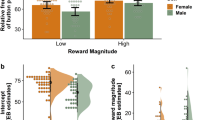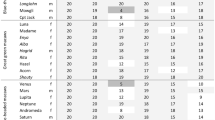Abstract
The human sense of fairness entails sensitivity not just to equality, the equal division of resources, but also to merit, the relationship between an individual’s share of resources and how hard they worked for their share. Recent evidence suggests that our sensitivity to equality has deep phylogenetic roots: several nonhuman animal species show an aversion to unequal reward distributions. However, the extent to which nonhuman animals share sensitivity to merit remains poorly understood, largely because previous studies have failed to properly manipulate work effort in inequity aversion tasks. Here, we tested whether cotton-top tamarins (Saguinus oedipus) would exhibit a differential response to inequity when acquiring rewards was either (1) effortful or (2) effortless. Subjects engaged in a pulling task in which they had an opportunity to deliver a disadvantageously unequal distribution of food to themselves and a partner (one piece for self, four pieces for partner). We made delivery effortful by adding a weight to the pulling handle. Critically, effort was calibrated to each individual. Results show that individuals varied markedly in their response to effort, highlighting the importance of manipulating work effort at the individual level. Overall, subjects showed little aversion to inequity. However, subjects were slightly less likely to accept inequity when doing so was effortful, although this effect was pronounced in only one individual. Our findings suggest a new method for capturing individual variation in effort and for studying the roots of the concept of merit in nonhuman animals.




Similar content being viewed by others
References
Adams JS (1965) Inequity in social exchange. In: Berkowitz L (ed) Advances in experimental social psychology, vol 2. Academic Press, New York, pp 267–299
Bates D, Maechler M, Bolker B (2012) Package ‘lme4’. http://cran.stat.sfu.ca/web/packages/lme4/lme4.pdf
Baumard N, Mascaro O, Chevallier C (2012) Preschoolers are able to take merit into account when distributing goods. Dev Psychol 48:492–498
Benenson J, Pascoe J, Radmore N (2007) Children’s altruistic behavior in the dictator game. Evol Hum Behav 28:168–175
Blake PR, McAuliffe K (2011) “I had so much it didn’t seem fair”: eight-year-olds reject two forms of inequity. Cognition 120:215–224
Bolker BM, Brooks ME, Clark CJ, Geange SW, Poulsen JR, Stevens MHH et al (2009) Generalized linear mixed models: a practical guide for ecology and evolution. Trends Ecol Evol 24:127–135
Bräuer J, Call J, Tomasello M (2006) Are apes really inequity averse? Proc R Soc B Biol Sci 273:3123–3128
Bräuer J, Call J, Tomasello M (2009) Are apes inequity averse? New data on the token-exchange paradigm. Am J Primatol 71:175–181
Brosnan SF (2006) Nonhuman species’ reactions to inequity and their implications for fairness. Soc Justice Res 19:153–185
Brosnan SF (2011) A hypothesis of the co-evolution of cooperation and responses to inequity. Front Neurosci 5:43
Brosnan SF, de Waal FBM (2003) Monkeys reject unequal pay. Nature 425:297–299
Brosnan SF, Schiff HC, de Waal FBM (2005) Tolerance for inequity may increase with social closeness in chimpanzees. Proc R Soc B Biol Sci 272:253–258
Brosnan SF, Talbot C, Ahlgren M, Lambeth SP, Schapiro SJ (2010) Mechanisms underlying responses to inequitable outcomes in chimpanzees, Pan troglodytes. Anim Behav 79:1229–1237
Brosnan SF, Flemming T, Talbot CF, Mayo L, Stoinski T (2011) Orangutans (Pongo pygmaeus) do not form expectations based on their partner’s outcomes. Folia Primatol 82:56–70
Burkart JM, van Schaik CP (2010) Cognitive consequences of cooperative breeding in primates? Anim Cogn 13:1–19
Burkart JM, Fehr E, Efferson C, van Schaik CP (2007) Other-regarding preferences in a non-human primate: common marmosets provision food altruistically. Proc Natl Acad Sci USA 104:19762–19766
Burkart JM, Hrdy SB, Van Schaik CP (2009) Cooperative breeding and human cognitive evolution. Evol Anthropol 18:175–186
Camerer C (2003) Behavioral game theory: experiments in strategic interaction. Princeton University Press, Princeton
Cronin KA, Snowdon CT (2008) The effects of unequal reward distributions on cooperative problem solving by cottontop tamarins, Saguinus oedipus. Anim Behav 75:245–257
Cronin KA, Schroeder KKE, Rothwell ES, Silk JB, Snowdon CT (2009) Cooperatively breeding cottontop tamarins (Saguinus oedipus) do not donate rewards to their long-term mates. J Comp Psychol 123:231–241
Damon W (1977) The social world of the child. Jossey-Bass, San Francisco
Dawes CT, Fowler JH, Johnson T, McElreath R, Smirnov O (2007) Egalitarian motives in humans. Nature 446:794–796
de Waal FBM, Berger ML (2000) Payment for labour in monkeys. Nature 404:563
Dindo M, de Waal FBM (2007) Partner effects on food consumption in brown capuchin monkeys. Am J Primatol 69:1–9
Fehr E, Schmidt KM (1999) A theory of fairness, competition, and cooperation. Q J Econ 114:817–868
Fehr E, Bernhard H, Rockenbach B (2008) Egalitarianism in young children. Nature 454:1079–1083
Fletcher GE (2008) Attending to the outcome of others: disadvantageous inequity aversion in male capuchin monkeys (Cebus apella). Am J Primatol 70:901–905
Freeman HD, Sullivan J, Hopper LM, Talbot CF, Holmes AN, Schultz-Darken N, Williams LE, Brosnan SF (2013) Different responses to reward comparisons by three primate species. PLoS ONE 8:e76297
Güth W, Schmittberger R, Schwartze B (1982) An experimental analysis of ultimatum bargaining. J Econ Behav Organ 3:367–388
Hauser MD, Chen MK, Chen F, Chuang E (2003) Give unto others: genetically unrelated cotton-top tamarins monkeys preferentially give food to those who altruistically give food back. Proc Roy Soc B Biol Sci 270:2363–2370
Henrich J (2004) Inequity aversion in capuchins? Nature 428:139
Henrich J, Boyd R, Bowles S, Camerer C, Fehr E, Gintis H, et al. (2005) “Economic man” in cross-cultural perspective: behavioral experiments in 15 small-scale societies. Behav Brain Sci 28:795–815; discussion 815–755
Hook JG, Cook TD (1979) Equity theory and the cognitive-ability of children. Psychol Bull 86:429–445
Hopper LM, Lambeth SP, Schapiro SJ, Bernacky BJ, Brosnan SF (2013) The ontogeny of social comparisons in rhesus macaques (Macaca mulatta). J Primatol 2:109
Horowitz A (2012) Fair is fine, but more is better: limits to inequity aversion in the domestic dog. Soc Justice Res 25:195–212
Hothorn T, Bretz F, Westfall P (2008) Simultaneous inference in general parametric models. Biom J 50:346–363
Jensen K, Call J, Tomasello M (2007) Chimpanzees are rational maximizers in an ultimatum game. Science 318:107–109
Kanngiesser P, Warneken F (2012) Young children consider merit when sharing resources with others. Plos One 7(8):e43979
Lakshminarayanan V, Santos LR (2008) Capuchin monkeys are sensitive to others’ welfare. Curr Biol 18:R999–R1000
Loewenstein GF, Thompson L, Bazerman MH (1989) Social utility and decision making in interpersonal contexts. J Pers Soc Psychol 57:426–441
Massen JJM, van den Berg LM, Spruijt BM, Sterck EHM (2012) Inequity aversion in relation to effort and relationship quality in long-tailed macaques (Macaca fascicularis). Am J Primatol 74:145–156
Mendres KA, de Waal FBM (2000) Capuchins do cooperate: the advantage of an intuitive task. Anim Behav 60:523–529
Neiworth JJ, Johnson ET, Whillock K, Greenberg J, Brown V (2009) Is a sense of inequity an ancestral primate trait? Testing social inequity in cotton top tamarins (Saguinus oedipus). J Comp Psychol 123:10–17
Piovesan M, Wengstrom E (2009) Fast or fair? A study of response times. Econ Lett 105:193–196
Proctor D, Williamson RA, de Waal FBM, Brosnan SF (2013) Chimpanzees play the ultimatum game. Proc Natl Acad Sci USA 110:2070–2075
Raihani NJ, McAuliffe K (2012) Human punishment is motivated by inequity aversion, not a desire for reciprocity. Biol Lett 8:802–804
Raihani NJ, McAuliffe K, Brosnan SF, Bshary R (2012) Are cleaner fish, Labroides dimidiatus, inequity averse? Anim Behav 84:665–674
Rand DG, Greene JD, Nowak MA (2012) Spontaneous giving and calculated greed. Nature 489:427–430
Range F, Horn L, Viranyi Z, Huber L (2009) The absence of reward induces inequity aversion in dogs. P Natl Acad Sci USA 106:340–345
Range F, Leitner K, Viranyi Z (2012) The influence of the relationship and motivation on inequity aversion in dogs. Soc J Res 25:170–194
Roberts G (2005) Cooperation through interdependence. Anim Behav 70:901–908
Roma PG, Silberberg A, Ruggiero AM, Suomi SJ (2006) Capuchin monkeys, inequity aversion, and the frustration effect. J Comp Psychol 120:67–73
Sanfey AG, Rilling JK, Aronson JA, Nystrom LE, Cohen JD (2003) The neural basis of economic decision-making in the Ultimatum Game. Science 300:1755–1758
Silberberg A, Roma PG, Ruggiero AM, Suomi SJ (2006) On inequity aversion in nonhuman primates. J Comp Psychol 120:76
Silberberg A, Crescimbene L, Addessi E, Anderson JR, Visalberghi E (2009) Does inequity aversion depend on a frustration effect? A test with capuchin monkeys (Cebus apella). Anim Cogn 12:505–509
Sloane S, Baillargeon R, Premack D (2012) Do infants have a sense of fairness? Psychol Sci 23:196–204
Smith P, Silberberg A (2010) Rational maximizing by humans (Homo sapiens) in an ultimatum game. Anim Cogn 13:671–677
Snowdon CT (1996) Parental care in cooperatively breeding species. In: Rosenblatt JS, Snowdon CT (eds) Parental care: evolution, mechanisms and adaptations. Academic Press, San Diego, pp 643–689
Stevens JR (2010) Donor payoffs and other-regarding preferences in cotton-top tamarins (Saguinus oedipus). Anim Cogn 13:663–670
Stevens JR, Hallinan EV, Hauser MD (2005a) The ecology and evolution of patience in two New World monkeys. Biol Lett 1:223–226
Stevens J, Rosati A, Ross K, Hauser MD (2005b) Will travel for food: spatial discounting in two new world monkeys. Curr Biol 15:1855–1860
Stevens J, Wood J, Hauser M (2007) When quantity trumps number: discrimination experiments in cotton-top tamarins (Saguinus oedipus) and common marmosets (Callithrix jacchus). Anim Cogn 10:429–437
Takimoto A, Fujita K (2011) I acknowledge your help: capuchin monkeys’ sensitivity to others’ labor. Anim Cogn 14:715–725
Takimoto A, Kuroshima H, Fujita K (2010) Capuchin monkeys (Cebus apella) are sensitive to others’ reward: an experimental analysis of food-choice for conspecifics. Anim Cogn 13:249–261
Talbot CF, Freeman HD, Williams LE, Brosnan SF (2011) Squirrel monkeys’ response to inequitable outcomes indicates a behavioural convergence within the primates. Biol Lett 7:680–682
R Core Team (2012) R: a language and environment for statistical computing. R Foundation for Statistical Computing, Vienna, Austria. http://www.R-project.org
Thornton A, Lukas D (2012) Individual variation in cognitive performance: developmental and evolutionary perspectives. Phil Trans R Soc B 367:2773–2783
van Wolkenten M, Brosnan SF, de Waal FBM (2007) Inequity responses of monkeys modified by effort. P Natl Acad Sci USA 104:18854–18859
Wascher CAF, Bugnyar T (2013) Behavioral responses to inequity in reward distribution and working effort in crows and ravens. PLoS ONE 8:e56885
Wynne CDL (2004) Fair refusal by capuchin monkeys. Nature 428:140
Acknowledgments
We are grateful to Kyle Foreman for building the testing apparatus. We thank Jessie Baker, Sarah Bayefsky, Alexandra Kass, Nick López, Clarissa Scholes, Sargent Shriver, Zachary Sulkowski and Courtney Taylor for their help with this study. Thanks also to Marc Hauser for his help designing this experiment. We are grateful to Richard Wrangham, Laurie Santos, Alex Thornton, Kristin Leimgruber and two anonymous reviewers for comments on earlier versions of this manuscript.
Author information
Authors and Affiliations
Corresponding author
Electronic supplementary material
Below is the link to the electronic supplementary material.
Rights and permissions
About this article
Cite this article
McAuliffe, K., Shelton, N. & Stone, L. Does effort influence inequity aversion in cotton-top tamarins (Saguinus oedipus)?. Anim Cogn 17, 1289–1301 (2014). https://doi.org/10.1007/s10071-014-0764-x
Received:
Revised:
Accepted:
Published:
Issue Date:
DOI: https://doi.org/10.1007/s10071-014-0764-x




